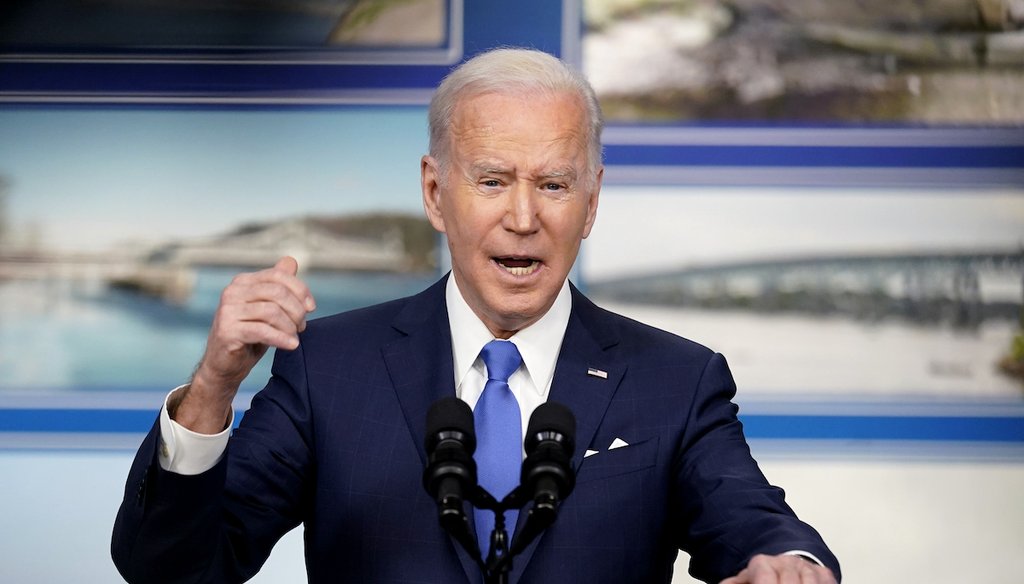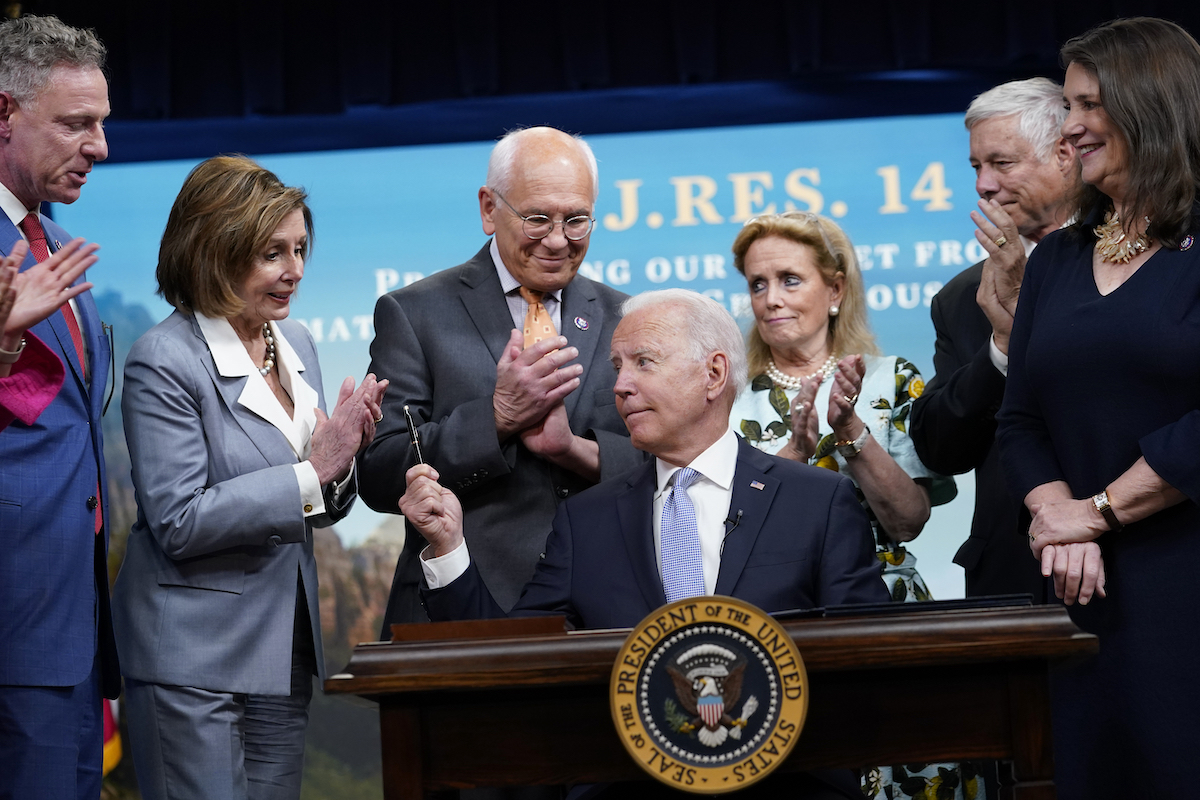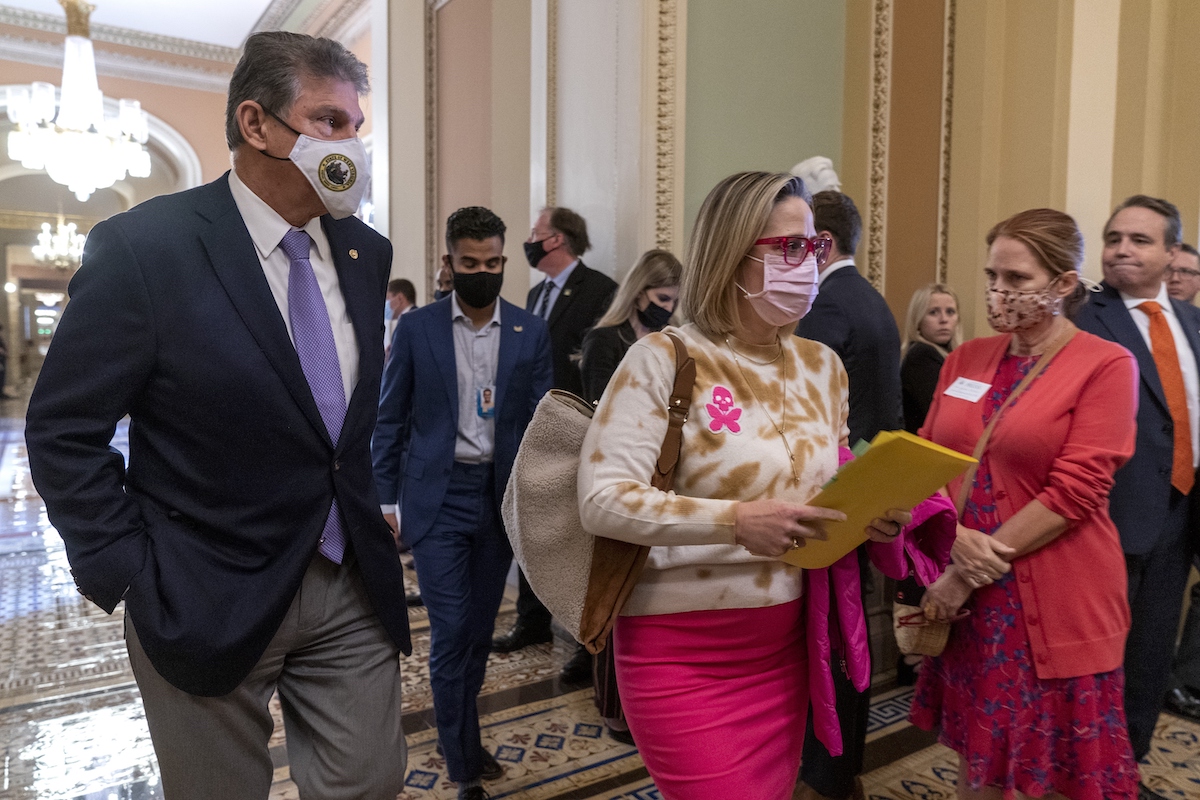Stand up for the facts!
Our only agenda is to publish the truth so you can be an informed participant in democracy.
We need your help.
I would like to contribute

President Joe Biden speaks about the infrastructure law he signed during an event at the White House on Jan. 14, 2022. (AP)
If Your Time is short
- PolitiFact is tracking 99 of Biden's campaign promises: 16 are currently rated Promise Kept, and 3 are Compromise. Another 46 are In the Works, and 24 are Stalled. No promises have been rated Promise Broken, and 10 are not yet rated. We will continue rating promises throughout Biden's presidency.
- PolitiFact also tracked promises from Obama and Trump. So far, Biden has done modestly worse than Obama in fully or partly keeping his promises, but a bit better than Obama in avoiding Stalled or Broken promises. Biden has been somewhat more successful than Trump in keeping his promises, though not dramatically so.
- This report includes details on how Biden has performed on his promises about the economy, the pandemic, racial justice, climate change, as well as his promises that seem to have fallen by the wayside. We also examine how Biden has navigated the extremely small margins of the Democratic majorities in Congress.
National politics right now is extraordinarily polarized by party. And much of today’s political rhetoric dwells more on name-calling than on nuts-and-bolts policy differences.
But at its root, control of government is still about implementing policy. And, quaint as it may seem, we’re here to track the policy agenda of President Joe Biden with our Biden Promise Tracker. He is the third president whose campaign promises we’ve tracked in this fashion.
Like his two most recent predecessors, Biden has put together a mixed record in implementing his policy agenda. This is not unexpected, since he has had to rely on thinner majorities in Congress during his first year than either Barack Obama and Donald Trump did.
That said, the Biden Promise Tracker does show some victories for the 46th president, along with a somewhat larger number of agenda items that have stalled. Meanwhile, almost half of his promises are in limbo, with some progress being made but nothing final yet.
For Biden, we chose 99 promises to evaluate, and we’ll continue rating them until he leaves the Oval Office.
Comparing Biden to Obama and Trump
Our rating system assesses campaign promises based on outcomes, not intentions. So, simply making an effort to pass something isn’t enough for a Promise Kept rating. Only full enactment of a promise qualifies for a Promise Kept, while partial enactment merits a Compromise rating. We applied the same standard to both Obama and Trump.
In the big picture, Biden has kept 16 of the 99 promises we tracked and achieved a compromise — basically, a partial achievement — on three more.
We rate 46 of his promises as In the Works and 24 as Stalled. (We also have a Promise Broken category, but this early in a president’s term we tend to place promises that haven’t been followed up on yet in the Stalled category instead.)
How does this compare to presidents Obama and Trump?
For Obama, we tracked 502 promises. During his first year in office, Obama earned a Promise Kept on about 18% of his promises, a Compromise on about 7%, either a Stalled or a Promise Broken on about 20%, and an In the Works on just over half.
In other words, Biden has done modestly worse than Obama in fully or partly keeping his promises, but a bit better than Obama in avoiding Stalled or Broken promises during the first 12 months in office.
Meanwhile, during Trump’s first year in office, when we tracked roughly the same number of promises as we are with Biden, he earned a Promise Kept on about 9% of his promises, a Compromise on about 6%, either a Stalled or a Promise Broken on 39%, and an In the Works on about 46%.
So Biden has been somewhat more successful than Trump in keeping his promises, though not dramatically so. Biden has managed to keep modestly more promises than Trump did, and he saw fewer promises move to the Stalled or Broken categories.
"Biden has been above average in achievements during his first year, given the partisan division in Congress," said John Frendreis, an emeritus political science professor at Loyola University Chicago. "Pundits and activists like to describe the current situation as Democratic control of both the legislative and executive branches, but this is really not true. The 50-50 split in the Senate only gives the Democrats ‘control’ in a limited set of circumstances."
Particularly given his narrow margins in Congress, Biden overall can claim a "solid record" for a first year in office, Frendreis said.
Promises on the economy and the pandemic
As a candidate, Biden said he would make special efforts to advance his agenda in four areas: ending the coronavirus pandemic, improving the economy, promoting racial equity, and tackling climate change.
Battling the pandemic and improving the economy — two goals that are closely linked — received significant attention from Biden early in his presidency.
Soon after Biden took office, Senate Democrats used the "reconciliation" process to pass the coronavirus and economic relief package, known as the American Rescue Plan, by just a simple majority, which is all that Democrats had in the chamber. No Republicans voted for the measure.
Some of Biden’s kept promises on the economy have stemmed from that law, including giving small businesses a "restart package" after pandemic-related shutdowns and helping state and local governments prevent budget shortfalls.
Other economic promises have been pushed along by the bipartisan infrastructure bill that Biden signed into law. To corral enough GOP support to ensure passage, Biden and Democratic leaders in the House and Senate separated out the broadly popular "hard" infrastructure funding and removed other agenda items that Democrats generally supported but Republicans did not. (Many of the agenda items opposed by the GOP were instead put into the Build Back Better bill, which is awaiting action in the Senate.)
One key promise, to expand broadband internet, or wireless broadband via 5G, to every American, took a major step forward with passage of the bill, although we’re officially rating it In the Works until we have a better sense of how successfully its provisions are being rolled out.
The infrastructure bill was the only major example of legislation for which Biden was able to secure significant bipartisan support. That was enough to earn him a Compromise on his promise to get bipartisan cooperation on the economy.
Fighting the pandemic has been more of a stop-and-start affair, due to the shifting nature of the pandemic.
The emergence of the delta variant of the coronavirus and then the omicron variant dashed the hopes of many that the pandemic would be over during Biden’s first year in office. Until we see clear signs of an end to the pandemic, Biden’s pledges to get COVID-19 under control and to use scientific evidence to determine COVID-19 openings and closings will not rate higher than In the Works.
However, Biden used executive orders or agency actions to achieve a Promise Kept for using the Defense Production Act to produce personal protective equipment for COVID-19 and securing 100 million COVID-19 vaccine shots for 50 million people in 100 days after taking office.
Executive actions, which don’t require the approval of Congress, are a well-trod path for presidents to keep their campaign promises. Obama and Trump used their powers in this way as well.
President Joe Biden hands House Speaker Nancy Pelosi a pen after a bill signing event at the White House complex on June 30, 2021. (AP)
Promises on racial justice and climate change
Running for president during a national reckoning on race prompted by the murder of George Floyd, Biden focused significant attention on racial justice. But he hasn’t made much progress in this area.
An effort to update the Voting Rights Act passed the House, but it is stalled in the Senate, where only one Republican, Alaska’s Lisa Murkowski, pledged to support the John Lewis Voting Rights Advancement Act. That’s far short of the 10 needed under the chamber’s current rules.
Meanwhile, Biden has taken no significant action on several criminal justice reform promises, including decriminalizing marijuana use, ending cash bail and ending mandatory minimum sentences. We have rated all three of these promises Stalled.
Andrew Sidman, chair of the political science department at John Jay College of Criminal Justice, said criminal justice reform has taken a back seat as the Biden administration focuses on other priorities. With an ongoing pandemic and economic challenges, "criminal justice reform is not a place where the president is going to try to spend political capital," Sidman said.
Also Stalled is Biden’s promise to support the study of reparations for slavery.
"Biden is wary of giving Republicans another rallying cry like they had this summer with critical race theory," said Niambi Carter, an associate professor of political science at Howard University, referencing a broad set of ideas about systemic bias and privilege that became a flashpoint in America's state legislatures and played a key role in some pivotal 2021 elections.
Biden has managed to achieve more on climate change. He’s used executive authority to score Promise Kept ratings on a few environmental efforts, including establishing new fuel economy standards and rejoining the Paris climate agreement.
Passage of the bipartisan infrastructure bill should help the build-out of electric vehicle charging stations and the expansion of rail and mass transit, which are key elements of Biden’s promise to put the U.S. on a course to net-zero emissions by 2050. But other key incentives to move the country away from fossil fuels will depend on passage of the Build Back Better package.
As for Biden’s promise to block new fracking on federal lands while not banning all fracking, a court ruling and pressure from oil and gas states have kept that promise Stalled.
Sen. Joe Manchin, D-W.Va., left, and Sen. Kyrsten Sinema, D-Ariz., after a Democratic policy luncheon on Nov. 16, 2021. (AP)
Small congressional margins have stymied many promises
The Democrats’ narrow congressional majorities have been particularly trying for Biden.
The biggest example is the Build Back Better bill, which has passed the House but has been subject to months of negotiation with the 49th and 50th Democratic votes in the Senate, Kyrsten Sinema of Arizona and Joe Manchin of West Virginia.
Generally speaking, we have rated promises that are included in the Build Back Better bill as In the Works, pending either passage or a clear legislative dead-end. The promises whose fate depends on what happens to the Build Back Better bill include offering tax credits for child care, repealing the law barring Medicare from negotiating lower drug prices, and guaranteeing 12 weeks of paid family and medical leave.
Numerous Biden promises have made progress in the House but have failed to advance in the Senate.
Gun control policies, including requiring background checks for all gun sales and banning the manufacture and sale of assault weapons and high-capacity magazines, are considered non-starters in the Senate. And House passage of a bill to end pay discrimination has not yet led to passage in the Senate.
Biden’s proposal to increase the federal minimum wage to $15 an hour hit a roadblock in the Senate when it was stripped from the American Rescue Plan. And a bill that would make union organizing easier for workers passed the House but has languished in the Senate.
Meanwhile, the political climate has stalled a measure that historically passed with bipartisan support: reauthorizing the Violence Against Women Act.
Some promises advance using executive authority, but others don’t
Biden has used executive powers to direct federal resources to help prevent violence against transgender women, to resume ties with the Palestinian Authority, and to reverse family separation policies for migrants that were expanded under Trump. All three merited a Promise Kept.
Presidents also tend to have a freer hand in pursuing their foreign policy agenda. Biden has done that by rejoining the Paris climate agreement and reaching out to the Palestinians, and he undertook a messy withdrawal from Afghanistan. (The latter earned him an In the Works for his pledge to end wars in Afghanistan and the Middle East; he accomplished the part involving Afghanistan but has yet to do so for the war in Yemen.)
Biden also notched a lower-profile foreign policy victory by working with allies to develop secure private-sector-led 5G telecommunication networks. He accomplished this by continuing Trump-era policies designed to isolate Huawei, a Chinese telecom giant that national security specialists fear could leave networks open to Chinese surveillance.
However, achieving foreign policy victories can be tricky even without having to deal with Congress. Biden has earned an In the Works for his promise to rejoin the Iran nuclear deal and a Stalled for his pledge to join allies to negotiate with North Korea on denuclearization. He also took no action on his promise to restore engagement with Cuba, earning a Stalled.
Promises that fell down the White House’s priority list
Just because presidents have the power to accomplish something using executive power doesn’t mean that they will use it. We found many promises made by Biden that have seen little or no progress during his first year in office, presumably because they have fallen lower on the White House’s priority list.
Younger Americans, who voted overwhelmingly for Biden, may be frustrated that Biden hasn’t kept his promise to forgive student loan debt from public colleges and universities. While Biden has enacted a pause on student loans due to the pandemic and made some smaller efforts to forgive the debts for certain categories of borrowers, he did not push to include full or even partial forgiveness in his Build Back Better bill. Another student-related promise, to make two years of community college or a high-quality training program tuition-free, was also left out.
Meanwhile, Biden has directed the Justice Department to wind down the federal government's use of private prisons, but his order didn’t cover the Department of Homeland Security, leaving his pledge to end for-profit detention centers for migrants Stalled.
And while elements of the American Rescue Plan advanced Biden’s promise to improve Obamacare, he did not offer significant follow-up on a related health care pledge, to offer a public health insurance option like Medicare.
One reality, Frendreis said, is that Biden’s first year could have been even worse.
"The conversation would be very different had the Democrats not won the two Georgia Senate seats to secure a majority" in January 2021, he said. "Had that not happened, Biden would be the first president in the 21st century to not have the semblance of a majority in his first two years — and virtually everything he would have tried legislatively would have been stalled."
RELATED: Events within and beyond Joe Biden’s control stymied progress on COVID-19 in his first year
RELATED: All of our fact-checks of President Joe Biden on our Truth-O-Meter
Jon Greenberg and Amy Sherman contributed to this article.
Our Sources
PolitiFact, Biden Promise Tracker main index page, accessed Jan. 13, 2022
Rhodium Group, Preliminary US Greenhouse Gas Emissions Estimates for 2021, Jan. 10, 2022
Email interview with Andrew Sidman, chair of the political science department at John Jay College of Criminal Justice, Dec. 21, 2021
Email interview with Niambi Carter, associate professor of political science at Howard University, Dec. 16, 2021
Email interview with John Frendreis, emeritus political science professor at Loyola University Chicago, Jan. 12, 2022








































